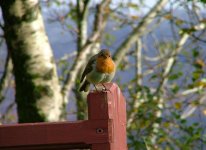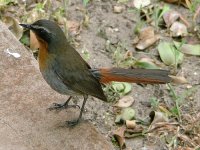Dave Kennedy
Well-known member
I don't know Alan, but is it possible that with the huge expanse of Kruger Park just over the river from you, the concentration of birdlife is reduced because there is so much more space for territory? Maybe UK birds have smaller territories for this reason? Maybe they have to work (ie sing) harder to retain their territories?
Perhaps a valid point, Sal. Many British Birds - for example, robin, blackbird, thrush, sparrow, dunnock, chaffinch, greenfinch, blue tit, great tit, coal tit etc. have a territory probably not much bigger than the average garden. Here on the Highveld I once paced out the distance between calling Rufous-naped Larks. The average distance was close to 150m (500 feet), which must approximate the territorial diameter of that bird in that particular area. This is quite large, and if other birds are similarly placed, then undoubtedly this would diminish the dawn chorus.
A few of our birds may have garden-sized territories - Cape Robin-chat, Crested Barbet, Karoo Thrush for example - but many more may be intermittent visitors rather than residents. It is worth noting that the European Robin, blackbird, chaffinch and so on sing more loudly than our local equivalents.
It might also be worth investigating the number of potential predators in each country....UK has cats, grey squirrels, kestrels, sparrowhawks, pine martens etc, while SA has cats, genets, mongoose, snakes, African Harrier Hawks, Coucals, Vervet monkeys, three kestrels, several small falcons, sparrowhawks etc. Perhaps in SA it's better to keep your head down.
Thanks for that interesting question, Allan - let's hope we get some interesting replies.
I've attached pics of two of the protagonists.
Best wishes,
Dave Kennedy





